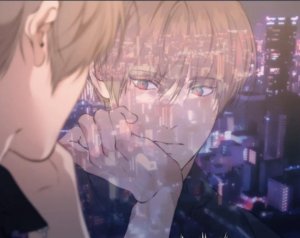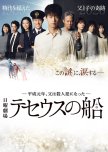This review may contain spoilers
Murder on the Orient Express
The Ship of Theseus is the translation of the original title of this drama.
The Ship of Theseus is a thought experiment about whether an object, after having had all of its original components replaced, remains the same object. In Greek mythology, Theseus, the mythical Greek founder-king of Athens, rescued the children of Athens from King Minos after slaying the Minotaur and then escaped onto a ship going to Delos. Each year, the Athenians commemorated this by taking the ship on a pilgrimage to Delos to honour Apollo. A question was raised by ancient philosophers: After several hundreds of years of maintenance, if each individual part of the Ship of Theseus was replaced, one at a time, was it still the same ship? (wikipedia)
So what do mythology, philosophy and japanese time slip drama have in common?
Shin accidentally goes 30years back in time and tries to stop a murder from happening and save his father from being accused of committing it. But every time he goes back in time, the future changes and so does his own future: he finds himself on a parallel timeline. So if he manages to change everything, will his future be same or different? Spoiler alert: his future is the same but with different state of his surroundings. Ship of Theseus: he changed everything and still ended up happily married and having a baby with the same woman but the path (ships parts) to it has been completely replaced. Is he still the same person even though he does not have the original Shin's memories (the original ship)? The question remains!
Time travel is hugely difficult to write about because it is impossible to explain logically. Every alteration in the past, necessarily creates another timeline and he can never go back to his original one.
The main plot is a serial murder killing left, right and centre apparently for no reason. Shin and his father try to discover and stop the killer who always seems to be one step ahead while they pointlessly run around without achieving anything. Red herrings abound; new suspects are introduced only to be murdered in the next episode. The plot moves at a breakneck speed. Until it gets too fast: new characters are constantly introduced, those seen just in passing become suspects: basically in last two episodes, everything goes upside down, the suspects are surprising and their reasoning psychotic! Shin runs around, repeatedly promising to save his family from doom and miserably failing, until the final solution turns out to be the right one!
I found the cinematography odd: I had a strange feeling of a low quality production throughout. It lacked warmth. Yes it is a crime drama taking place in the winter but still, it should not have looked so sharp and crisp. The writing was excellent but they crammed too much in it and I would have preferred it to be slower and more menacing. There are a few loose, unexplained events and characters' fates (two policemen, the book, the notebook, the drawings...) The culprit turned out to be based on the one from the aforementioned Agatha Christie's novel. The make up for the older versions of adult characters was weirs: it did not look natural at all: they seemed to be older than they should be! The music was appropriately heavy, sentimental and sad, stressing the tragic events on the screen.
As for the actors, they were all amazing. Particularly the kid who played Mikio: he managed to show the character's multiple different faces with an amazing ease. He is infinitely talented. The actor playing Shin is in excellent physical shape: there was at least one scene in every episode where he runs breathlessly and effortlessly around, either looking for something or trying to get somewhere
I love time slip stories, and I enjoyed this one a lot until I got fed up with the constant twists and turns and fake culprits and annoyed with asian societies as depicted in many dramas where the family of a criminal is eternally held responsible for its one member's misdeeds. Nevertheless, it was a great watch, i had fun!
The Ship of Theseus is a thought experiment about whether an object, after having had all of its original components replaced, remains the same object. In Greek mythology, Theseus, the mythical Greek founder-king of Athens, rescued the children of Athens from King Minos after slaying the Minotaur and then escaped onto a ship going to Delos. Each year, the Athenians commemorated this by taking the ship on a pilgrimage to Delos to honour Apollo. A question was raised by ancient philosophers: After several hundreds of years of maintenance, if each individual part of the Ship of Theseus was replaced, one at a time, was it still the same ship? (wikipedia)
So what do mythology, philosophy and japanese time slip drama have in common?
Shin accidentally goes 30years back in time and tries to stop a murder from happening and save his father from being accused of committing it. But every time he goes back in time, the future changes and so does his own future: he finds himself on a parallel timeline. So if he manages to change everything, will his future be same or different? Spoiler alert: his future is the same but with different state of his surroundings. Ship of Theseus: he changed everything and still ended up happily married and having a baby with the same woman but the path (ships parts) to it has been completely replaced. Is he still the same person even though he does not have the original Shin's memories (the original ship)? The question remains!
Time travel is hugely difficult to write about because it is impossible to explain logically. Every alteration in the past, necessarily creates another timeline and he can never go back to his original one.
The main plot is a serial murder killing left, right and centre apparently for no reason. Shin and his father try to discover and stop the killer who always seems to be one step ahead while they pointlessly run around without achieving anything. Red herrings abound; new suspects are introduced only to be murdered in the next episode. The plot moves at a breakneck speed. Until it gets too fast: new characters are constantly introduced, those seen just in passing become suspects: basically in last two episodes, everything goes upside down, the suspects are surprising and their reasoning psychotic! Shin runs around, repeatedly promising to save his family from doom and miserably failing, until the final solution turns out to be the right one!
I found the cinematography odd: I had a strange feeling of a low quality production throughout. It lacked warmth. Yes it is a crime drama taking place in the winter but still, it should not have looked so sharp and crisp. The writing was excellent but they crammed too much in it and I would have preferred it to be slower and more menacing. There are a few loose, unexplained events and characters' fates (two policemen, the book, the notebook, the drawings...) The culprit turned out to be based on the one from the aforementioned Agatha Christie's novel. The make up for the older versions of adult characters was weirs: it did not look natural at all: they seemed to be older than they should be! The music was appropriately heavy, sentimental and sad, stressing the tragic events on the screen.
As for the actors, they were all amazing. Particularly the kid who played Mikio: he managed to show the character's multiple different faces with an amazing ease. He is infinitely talented. The actor playing Shin is in excellent physical shape: there was at least one scene in every episode where he runs breathlessly and effortlessly around, either looking for something or trying to get somewhere
I love time slip stories, and I enjoyed this one a lot until I got fed up with the constant twists and turns and fake culprits and annoyed with asian societies as depicted in many dramas where the family of a criminal is eternally held responsible for its one member's misdeeds. Nevertheless, it was a great watch, i had fun!
Was this review helpful to you?


 4
4



